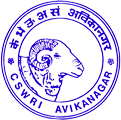BackCadre Strength » Dr Seiko Jose
Dr Seiko Jose
| Designation: |
Scientist(Textile Chemistry), Textile Manufacturing and Textile Chemistry Division (E-mail Id: [email protected])
|
|
 |
Contact Details: Division of TMTC
CSWRI, Avikanaagr
304501
| Phone No. |
: |
01437-220179(O), 04872307857(R) |
| Mobile No. |
: |
8420075513 |
| Fax No. |
: |
01437 220163 |
| Email Id |
: |
[email protected] |
Academic Background
Educational Qualifications
B.Sc - ( Industrial Chemistry); 2001-2004
M.Sc - (Textile Chemistry) ; 2004-2006
A.R.S - (Textile Chemistry); 2012
Research Experience:
Industrial Experience – 6 years 7 months
Research Experience- 7 years
Awards and Professional Affiliations
Awards
University IInd rank in B.Sc Industrial chemistry,2004, University of Calicut
University IInd rank in M.Sc Textile chemistry,2006, Alagappa University
Best Research papers in International Journals
1. Colouration of textiles using roasted peanut skin-an agro processing residue. R Pandey, S Patel, P Pandit, S Nachimuthu, S Jose*, Journal of Cleaner Production, 2018, 172, 1319-1326. (IF – 6.39)
2. Exploration of future prospects of Indian pineapple leaf, an agro waste for textile application. D Hazarika, N Gogoi, S Jose*, R Das, G Basu, Journal of Cleaner Production, 2017, 141, 580-586. (IF – 6.39)
3. Improvement of water quality of remnant from chemical retting of coconut fibre through electrocoagulation and activated carbon treatment. S Jose, L Mishra, S Debnath, S Pal, P K Munda, G Basu . Journal of Cleaner Production, 2019, 210, 630-637 (IF – 6.39)
4. Processing of jute using water miscible conditioning agent. S Jose*, R Das, I Mustafa, S Karmakar, G Basu. Industrial Crops and Products, 2017, 102, 1-6 (IF – 4.19)
5. Accelerated retting cum softening of coconut fibre. G Basu, L Mishra, S Jose, AK Samanta. Industrial Crops and Products, 2015, 77, 66-73 (IF – 4.19)
6. Chickpea husk – A potential industrial agro residue for the colouration and functional finishing of textiles. S Jose, P Pandit, R Pandey. 2019. Industrial Crops and Products, 2019, 142(IF – 4.19)
7. Fire retardant finish of jute fabric with nano zinc oxide. AK Samanta, R Bhattacharyya, S Jose*, G Basu, R Chowdhury, Cellulose, 2017, 42 (2), 1143-1157. (IF – 3.91)
8. Study on Reuse of Coconut Fiber Chemical Retting Bath. Part 1: Retting Efficiency.S Jose*, L Mishra, G Basu, AK Samanta. Journal of Natural Fibers, 2016, 13 (5), 603-609 (IF – 1.25)
9. Study on Reuse of Coconut Fiber Chemical Retting Bath. Part II---Recovery and Characterization of Lignin. S Jose*, L Mishra, G Basu, A Kumar Samanta. Journal of Natural Fibers, 2017, 14, (4), 510-518 (IF – 1.25).
10. Eco-Friendly Dyeing of Silk and Cotton Textiles Using Combination of Three Natural Colorants. S Jose*, H Gurumallesh Prabu, L Ammayappan. Journal of Natural Fibers, 2016, 14 (1), 40-49 (IF – 1.25).
11. Development of Apparels from Silk Waste and Pineapple Leaf Fiber. P Hazarika, D Hazarika, B Kalita, N Gogoi, S Jose*, G Basu. Journal of Natural Fibers, 2018, 15 (3), 416-424. (IF – 1.25).
12. Hibiscus Sabdariffa (Roselle) - A potential source of bast fiber. B Kalita, S Jose*, S Baruah, S kalita, S Saikia. Journal of Natural Fibers. 2018. 16:49-57. (IF – 1.25).
13. An Overview on Production, Properties, and Value Addition of Pineapple Leaf Fibers.S Jose*, R Salim, L Ammayappan. Journal of Natural Fibers, 2016, 13 (3), 362-373. (IF – 1.25)
14. Potentiality of Indian Pineapple Leaf Fibre for Apparels. S Jose*, R Das, I Mustafa, S Karmakar, G Basu. Journal of Natural Fibers. 2018. doi.org/10.1080 /15440478.2018.1428844. (IF – 1.25)
15. Effect of Transglutaminase Enzyme on Physicomechanical Properties of Rambouillet Wool Fiber. B Soun, D Kaur, S Jose*. Journal of Natural Fibers. 2018. doi.org/10.1080 /15440478.2018.1534187, (IF – 1.25)
16. Dyeing of Mulberry silk using binary combination of Henna Leaves and Monkey Jack bark.2019. G Boruah, A R Phukan, B B Kalita, P Pandit and S Jose*. Journal of Natural Fibers doi.org/10.1080/15440478.2019.1616649 (IF – 1.25)
17. Water repellent finishing on eri silk fabric using nano silica. Borah, M.P., S Jose*, Kalita, B. B., DB Shakyawar DB&Pandit, P. 2019.The Journal of The Textile Institute. doi.org/10.1080/00405000.2019.1659470
18.Moth proofing of wool fabric using nano kaolinite. S Jose*, S Nachimuthu, S Das, A Kumar. The Journal of The Textile Institute, 2018,109(2),225-231 (IF – 1.06)
19. Coating of lightweight wool fabric with nanoclay for fire retardancy. S Jose*, S Nachimuthu, S Das, A Kumar. The Journal of The Textile Institute. 2018, 110, (5), 764-770
20. Potential of biomimicry in the field of textile technology. S Das, N Shanmugam, A Kumar, S Jose*. Bioinspired, Biomimetic and Nanobiomaterials, 2017, 1-12 (IF – 0.78)
21. Novel methods of degumming and bleaching of Indian flax variety Tiara. R Pandey, S Jose, G Basu, M.K. Sinha. Journal of Natural Fibers, 2018, doi.org /10.1080/15440478.2019.1687067 (IF – 1.25)


